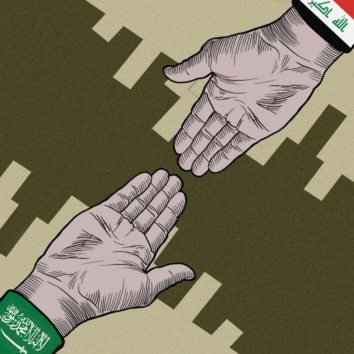
Iraq’s relations with other Arab states were never devoid of problems, right since the establishment of the Arab League. Ties were always governed by policies that paved the way for the temporary emergence of some Arab capitals as decision-makers over the past half century. Baghdad became one of these capitals, after Egypt signed the Camp David accords with Israel in 1978, following which, its role in the Arab world diminished dramatically.
However, Iraqi-Arab relations since then deteriorated despite all the backing Iraq received from Arab countries, especially Arab Gulf countries, during its war with Iran from 1980 to 1988.
These relations further deteriorated after Saddam Hussain invaded Kuwait in 1990. Iraq’s role as the country that determined the features of Arab policies ended at that point. Afterwards, its relations with Arab states entered a new, complex phase, as a result of problems seen in the country and elsewhere after the American invasion, the collapse of Saddam’s regime and the emergence of successive governments in the new system. The new form of government in Iraq favoured the formation of regional alliances that detached Iraq from its Arab surroundings and created fear among its Arab neighbours.
These deteriorating relations worsened even further as a result of the irresponsible policies of former prime minister Nouri Al Maliki. Over a period of eight years, he neglected Iraq’s national security to a degree that allowed Daesh (Islamic State of Iraq and the Levant) to control large swathes of its territory.
This despite the fact that Iraq has no problems or border disputes with four Arab countries: Syria, Jordan, Saudi Arabia and Kuwait.
Moreover, the country does not have undeclared problems related to wealth in the border areas with these countries, unlike the situation with Iran, where differences and conflicts do not stop with land and water disputes but go beyond to disagreements over the ownership of more than one oil field.
The change that took place this August in Iraq, following the removal of Al Maliki and the appointment of Haidar Al Abadi as the new Prime Minister was not just a change in face; it was a completely new approach to politics at home and abroad, which was welcomed in Arab circles.
This came after influential people in the Iraqi political process were convinced that the continuation of tense relations with neighbouring countries would have serious consequences for the security of Iraq. They also saw that fixing errors in these relations would be a part of the strategy to address the Daesh problem.
The US was also keen on implementing this strategy and stuck to it by continuing to put pressure on all relevant parties. In this context, arrangements were made for the visit of Iraqi President Fouad Masoum to Saudi Arabia. Senior officials in both countries were positive about the visit as a possible step towards improving ties between Riaydh and Baghdad and they wanted to make the visit a success. However, the Saudi media said there were some aspects that muddied this positive atmosphere. One was Al Abadi’s visit to Iran, which preceded his visit to Saudi Arabia. Media felt that this visit was not in line with the relative independence in political decision-making demonstrated by Al Abadi after taking office. The Saudi media interpreted Al Abadi’s visit as a message that Iraqi regional policy remained unchanged.
The second criticism that was directed towards Al Abadi was about his harsh comments on US Vice-President Joe Biden. Al Abadi said he was surprised at Biden’s apology to Turkey, the UAE and Saudi Arabia for past statements he had made about these countries, accusing them of supporting extremist organisations, which sparked outrage in these nations. It would have been wiser for the Iraqi political administration to ignore these statements altogether and not to emphasise any observation that would impede efforts to normalise Iraq–Gulf Cooperation Council relations, which have become an important gateway of Iraqi-Arab relations. But despite the optimistic atmosphere that accompanied Masoum’s visit to Saudi Arabia, it seems futile to have a lot of expectations from it.
Major differences still remain between Riyadh and Baghdad regarding important issues in the region, most notably the conservative Saudi position towards the change that took place in Iraq following the downfall of Saddam’s regime in 2003 and Iraq’s ties with the Syrian regime. And the difference in opinion on strategic alliances in the region cannot be resolved without a series of actions to restore confidence between the two countries on the basis of understanding of each other’s interests.
Optimism regarding the outcome of this visit would be justified if it were to be followed by concrete steps, notably the reopening of the Saudi embassy in Baghdad and invitation to the Iraqi prime minister to visit Riyadh, especially as he had announced on September 22 his readiness to visit Saudi Arabia to open a new page in the two countries’ relations. This will serve as a step towards erasing the reservations against the system in Iraq since 2003, which is one of the biggest obstacles in the path to normalisation of ties between the two countries.
Mohammad Akef Jamal is an Iraqi writer based in Dubai.









